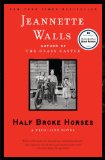Summary | Excerpt | Reading Guide | Reviews | Beyond the Book | Readalikes | Genres & Themes | Author Bio

A True-Life Novel
by Jeannette Walls
By first light, you could see that the water still covered the ground. In most places, a flash flood drained away after a couple of hours, but the pasture was in bottomland near the river, and sometimes the water remained for days. But it had stopped moving and had begun seeping down through the sinkholes and mudflats.
"We made it," I said.
I figured it would be safe to wade through the water, so we scrambled out of the cottonwood tree. We were so stiff from holding on all night that our joints could scarcely move, and the mud kept sucking at our shoes, but we got to dry land as the sun was coming up and climbed the hill to the house just the way I had seen it.
Dad was on the porch, pacing back and forth in that uneven stride he had on account of his gimp leg. When he saw us, he let out a yelp of delight and started hobbling down the steps toward us. Mom came running out of the house. She sank to her knees, clasped her hands in front of her, and started praying up to the heavens, thanking the Lord for delivering her children from the flood.
It was she who had saved us, she declared, by staying up all night praying. "You get down on your knees and thank your guardian angel," she said. "And you thank me, too."
Helen and Buster got down and started praying with Mom, but I just stood there looking at them. The way I saw it, I was the one who'd saved us all, not Mom and not some guardian angel. No one was up in that cottonwood tree except the three of us. Dad came alongside me and put his arm around my shoulders.
"There weren't no guardian angel, Dad," I said. I started explaining how I'd gotten us to the cottonwood tree in time, figuring out how to switch places when our arms got tired and keeping Buster and Helen awake through the long night by quizzing them.
Dad squeezed my shoulder. "Well, darling," he said, "maybe the angel was you."
We had a homestead on Salt Draw, which flowed into the Pecos River, in the rolling gritty grassland of west Texas. The sky was high and pale, the land low and washed out, gray and every color of sand. Sometimes the wind blew for days on end, but sometimes it was so still you could hear the dog barking on the Dingler ranch two miles upriver, and when a wagon came down the road, the dust it trailed hung in the air for a long time before drifting back to the ground.
When you looked out across the land, most everything you could see -- the horizon, the river, the fence lines, the gullies, the scrub cedar -- was spread out and flat, and the people, cattle, horses, lizards, and water all moved slowly, conserving themselves.
It was hard country. The ground was like rock -- save for when a flood turned everything to mud -- the animals were bony and tough, and even the plants were prickly and sparse, though from time to time the thunderstorms brought out startling bursts of wildflowers. Dad said High Lonesome, as the area was known, wasn't a place for the soft of head or the weak of heart, and he said that was why he and I made out just fine there, because we were both tough nuts.
Our homestead was only 160 acres, which was not a whole lot of land in that part of Texas, where it was so dry you needed at least five acres to raise a single head of cattle. But our spread bordered the draw, so it was ten times more valuable than land without water, and we were able to keep the carriage horses Dad trained, the milking cows, dozens of chickens, some hogs, and the peacocks.
The peacocks were one of Dad's moneymaking schemes that didn't quite pan out. Dad had paid a lot of money to import breeding peacocks from a farm back east. He was convinced that peacocks were a sure-fire sign of elegance and style, and that folks who bought carriage horses from him would also be willing to shell out fifty bucks for one of those classy birds. He planned to sell only the male birds so we'd be the sole peacock breeders this side of the Pecos.
Excerpted from Half Broke Horses by Jeannette Walls. Copyright © 2009 by Jeannette Walls. Excerpted by permission of Simon & Schuster. All rights reserved. No part of this excerpt may be reproduced or reprinted without permission in writing from the publisher.
Your guide toexceptional books
BookBrowse seeks out and recommends the best in contemporary fiction and nonfiction—books that not only engage and entertain but also deepen our understanding of ourselves and the world around us.